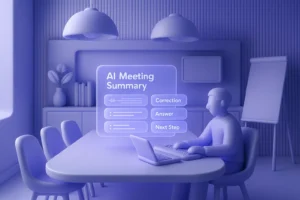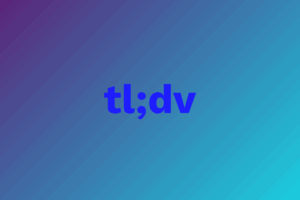A few months ago, a colleague introduced me to Notta — an AI meeting note taker designed for transcription and summaries. I gave it a shot. And to be fair, my first impression was positive: clean interface, accurate transcripts, and even a mind map that turned messy meetings into tidy visuals. It felt like a smart entry into the world of AI note taking tools.
But after a couple of weeks, the cracks started to show.
The free plan only let me record for 3 minutes per session — which meant I couldn’t record a real meeting end to end. AI summaries were limited to 10 per month, which I burned through in just a few calls. Features I assumed were standard — like calendar sync, full-length recording, task capture — all sat behind the upgrade wall.
I’m not against paying for good software. But Notta felt more like a fancy notepad than a real assistant. I had transcripts. What I didn’t have was traction.
So I started looking for a smarter AI note taker that could actually help me move work forward — not just transcribe. That’s when I found Proactor, a real-time AI meeting note taker that changed how I handle calls completely.
What Proactor Did Differently
From the very first meeting, I realized Proactor wasn’t just transcribing — it was thinking. Compared to typical AI transcribe tools, it felt like a note taking AI that understood not just what was said, but what needed to happen next.
- When I said “Let’s regroup next week,” it instantly prompted a follow-up task.
- When I mentioned budget being tight, it surfaced suggestions on how to handle pricing objections.
- When I referenced an old plan from a past call, it pulled up the exact action item I had forgotten.
Then came the part that really won me over: after the call, Proactor automatically generated a full Meeting Wiki — with structured takeaways, action items, and even AI advice tailored to the conversation.
And the more I used it, the smarter it got.
Once I had enough meetings in the system, I could start using the AI assistant outside of calls. I’d type:
“What did I say about Q4 targets?”
“What tasks are still open from my last three client meetings?”
It answered instantly — pulling the right context, catching things I’d forgotten, and filling gaps I didn’t know I missed.
I didn’t have to rewatch anything. I didn’t have to explain myself. I didn’t have to phrase things perfectly like with ChatGPT. It just knew. And that changed everything about how I work.
Notta vs Proactor: Real Differences I Noticed
| Feature | Notta (Free Plan) | Proactor (Free Plan) |
|---|---|---|
| Free Transcription | 3 minutes/recording | 30 minutes/month |
| AI Summaries | 10/month | 100 AI credits (usable across features) |
| Real-Time Follow-up Detection | ❌ | ✅ |
| Meeting Memory | ❌ | ✅ |
| Language Support | English, 中文, 日本語, and more | 8 languages incl. 中文, 日本語, العربية |
| Mind Map | ✅ (Visual) | ❌ (But more actionable Wiki output) |
Notta is sleek, no doubt. It’s a solid choice if all you need is a clean transcript from your AI note taker. But Proactor goes beyond what most AI meeting note takers offer — it helps drive clarity, decisions, and momentum. But it felt more like a recorder with flair. Proactor felt like a partner that understood my workflow.
What I Use Now — and Why
I still recommend Notta for anyone who needs fast transcripts or works solo. But once I was in more high-stakes meetings — client calls, sales reviews, team syncs — I needed more than text.
Proactor helped me:
- Stay on top of action items in real time
- Ask better questions after the meeting was over
- Make decisions faster — without replaying a single recording
Now, every meeting is searchable. Every commitment is remembered. Every next step is surfaced before I forget.
I don’t just record meetings anymore. I act on them.
Final Verdict
If you’re comparing AI note takers, Notta is a reliable place to start.
But if you want an AI meeting note taker that thinks ahead, remembers your conversations, and turns them into action — not just notes?
Go with Proactor.






